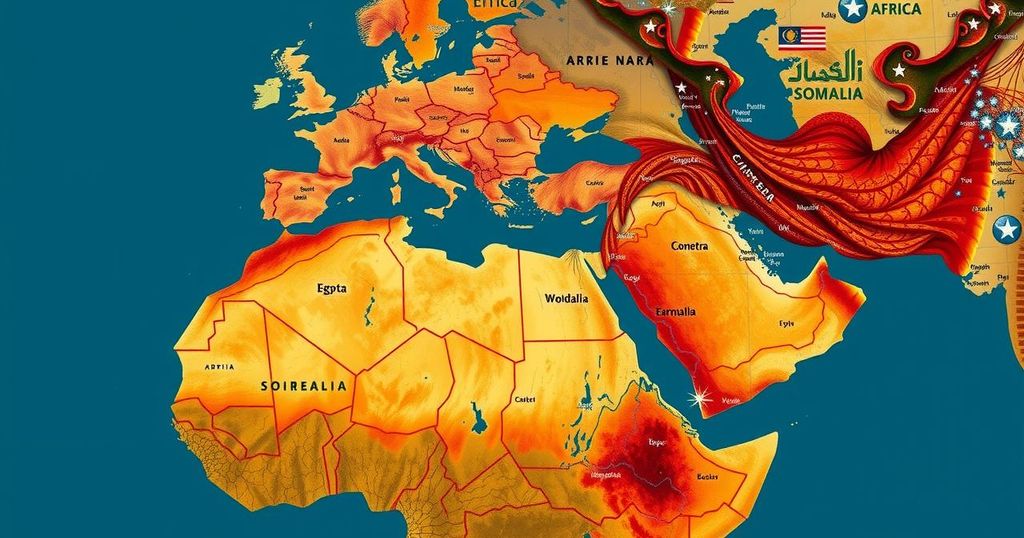Shifting Alliances in the Horn of Africa: The Egypt-Eritrea-Somalia Axis
The trilateral summit involving Egypt, Eritrea, and Somalia represents a pivotal shift in the Horn of Africa’s geopolitics, signaling a strategic alliance aimed at countering Ethiopia’s influence amid ongoing regional tensions related to the Grand Ethiopian Renaissance Dam. This new partnership raises concerns over potential proxy conflicts, while Ethiopia is urged to bolster diplomatic ties to safeguard its interests.
The recent trilateral summit involving Egypt, Eritrea, and Somalia, convened in Asmara, marks a critical shift in the geopolitical landscape of the Horn of Africa—an area historically plagued by instability and rivalry. Positioned as an initiative to enhance cooperation in the face of regional security concerns, the summit’s underlying motive appears to be encircling Ethiopia, a nation whose influence looms large in the region. Leaders Isaias Afwerki of Eritrea, Abdel Fattah al-Sisi of Egypt, and Hassan Sheikh Mohamud of Somalia publicly reaffirmed their commitment to territorial integrity and external non-interference, yet the discussions underscore a strategic alignment against Ethiopian actions. Ethiopia is at the epicenter of various regional dynamics, especially due to its contentious dealings with Somaliland and ongoing disputes with Egypt concerning the Grand Ethiopian Renaissance Dam (GERD). Somalia’s recent military partnership with Egypt, which includes arms supplies to combat the al-Shabaab insurgency, signals a strengthening of ties that diminishes Ethiopia’s previously more robust relationships with its neighbors. The absence of direct references to Ethiopia during the summit belies the evident concerns triggered by its maneuvers. Egypt’s persistent apprehensions regarding the GERD, a project they perceive as an existential threat due to its location on the Blue Nile, complicate matters further, especially as negotiations between the nations remain stalled. Eritrea’s involvement in this alliance bolsters its own desire for influence within a region characterized by its traditional isolation. Known for its authoritarian regime under President Isaias Afwerki, Eritrea’s geographic positioning near the strategically vital Bab el-Mandeb Strait enhances its importance in securing pivotal trade routes. Thus, the partnership with Egypt serves as a counterbalance to the perceived encroachment of Ethiopia’s growth in power. Significantly, tensions are escalating as Somalia’s frustration with Ethiopia’s engagements in Somaliland rekindles historical grievances. The Asmara meeting suggests a reconfiguration of power dynamics within the Horn of Africa, as Egypt, Eritrea, and Somalia collaborate to fortify regional stability while curtailing Ethiopia’s influence. The overarching theme of stability proclaimed at the summit juxtaposes with underlying tensions, particularly Egypt’s long-standing rivalry with Ethiopia over the GERD, raising the prospect of proxy conflicts fuelled by alliances that concentrate military resources and political capital against Ethiopia. Ethiopia now faces a pivotal moment where rapid diplomatic engagement is essential. It must navigate existing relationships with Egypt and Eritrea strategically while consolidating international support from entities such as the United States. Establishing a cooperative framework for Nile water management could mitigate some tensions, but Ethiopia’s success in fortifying its own regional relationships will be critical. In a region already beset by complexities, Ethiopia’s response to these shifting alliances will significantly impact its future security and stability.
The Horn of Africa has been a focal point for geopolitical tensions and alliances primarily due to the historical rivalries and instabilities experienced within the region. Ethiopia, as the second most populous nation in Africa, carries considerable influence, especially regarding its relationships with its neighbors. The Grand Ethiopian Renaissance Dam has amplified tensions between Ethiopia and Egypt, given the latter’s fears of losing critical water supplies. Additionally, the relationship dynamics involving Eritrea and Somalia have evolved amidst their own historical grievances and aspirations for autonomy and regional control. The recent summit between these three nations is a stark indication of shifting alliances that are likely to complicate Ethiopia’s regional relations.
The emergence of a united front between Egypt, Eritrea, and Somalia signifies a significant reorientation of alliances in the Horn of Africa, marked by a shared objective of countering Ethiopia’s growing influence. While the summit’s official focus was on fostering cooperation and legitimacy within the region, the underlying motivations reveal a strategic realignment aimed at addressing mutual concerns surrounding regional security. Ethiopia’s timely diplomatic efforts and ability to manage its relationships will be paramount in navigating this complex geopolitical scenario and ensuring its future stability in a challenging environment.
Original Source: thehill.com




Post Comment